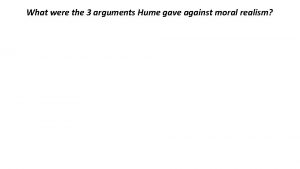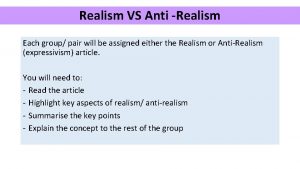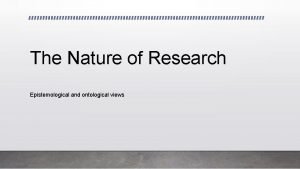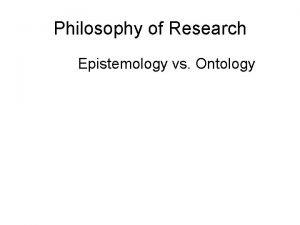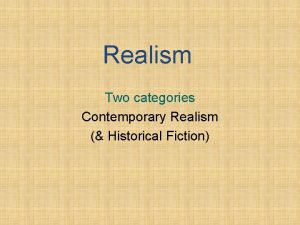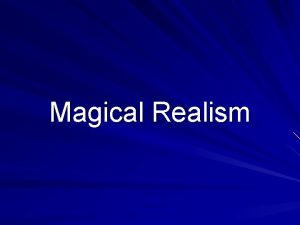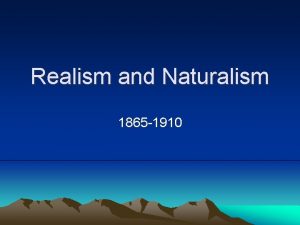Realism in Marketing Research A Third Way Ontological







- Slides: 7

Realism in Marketing Research: A Third Way Ontological and Epistemological Approach Presentation to International Marketing and Services Management Academic Unit, Salford Business School March 2016 Dr. Peter Reeves

Realism Interpretivist Positivist Value Laden Multiple realities and perceptions Subjective Value Free One single measurable Reality Objective

ONTOLOGY- what is the nature and form of reality? EPISTEMOLOGY What is the relationship between the researcher and reality? METHODOLOGY The technique used by the researcher to discover reality Derived and Adapted from Guba and Lincoln, 1994 and Perry et al, 1999

REALIST ONTOLOGY Reality is real and has a common understanding, yet this reality can only be imperfectly and probabilistically understood (Perry et al, 1999) Triangulation with many sources

REALIST EPISTEMOLOGY Modified Objectivism – Findings of the research are probably true but not guaranteed to be true (Perry et al, 1999) Reality cannot be certain (Riege, 2003) Siegel (1983) “to claim that a scientific proposition is true is not to claim that it is certain ; rather, it is to claim that the world as a proposition says it is” (quoted in Peter (1992, p. 75) and Hunt (1990, p. 12)) An individual’s perception is “a window on reality, through which a picture of reality can be triangulated, with other perceptions” (Perry et al, 1999, p. 18) One reality yet multiple perceptions of that reality

REALISM AND METHODOLOGY Realism is particularly suitable for case study methodology (Healy and Perry, 2000, Perry et al, 1999, Riege 2003) However realism could be used as the conceptual framework for other research methodologies. (See Hunt, 2003 for possible realist research avenues)

References and reading Guba, E. and Y. Lincoln (1994) Competing paradigms in qualitative research, In Denzin, N. and Y. Lincoln (eds. ) Handbook of Qualitative Research, (pp. 105 -117), Thousand Oaks: Sage. Healy, M. and C. Perry (2000) Comprehensive criteria to judge validity and reliability of qualitative research within the realist paradigm, Qualitative Marker Research: An International Journal, 3 (3) 118 -126. Hunt, S. (1990) Truth in marketing theory and research, Journal of Marketing, 54 (July), 1 -15. Hunt, S. (1992) For reason and realism in marketing, Journal of Marketing, 56 (April), 89 -102. Hunt, S. (2003) Controversy in marketing theory, for reason, realism, truth and objectivity, ME Sharpe: London Perry, C. (1998) Processes of a case study methodology for postgraduate research in marketing, European Journal of Marketing, 32 (9/10), 785 -802. Perry, C, Riege, A. and L. Brown (1999) Realism’s role among scientific paradigms in marketing research, Irish Management Journal, 12 (2), 16 -23 Peter, J. (1992) Realism or relativism for marketing theory and research: A comment on Hunt’s “Scientific Realism”, Journal of Marketing, 56, (April), 72 -79. Riege, A. (2003) Validity and reliability tests in case study research: a literature review with “hands on” applications for each phase, Qualitative Marker Research: An International Journal, 6 (2), 75 -86.
